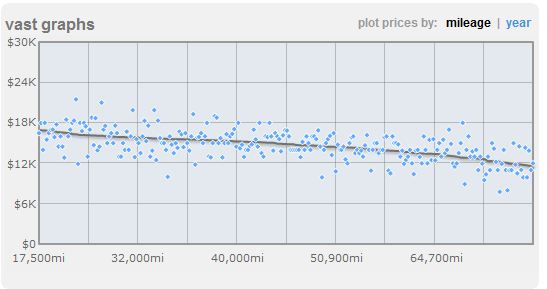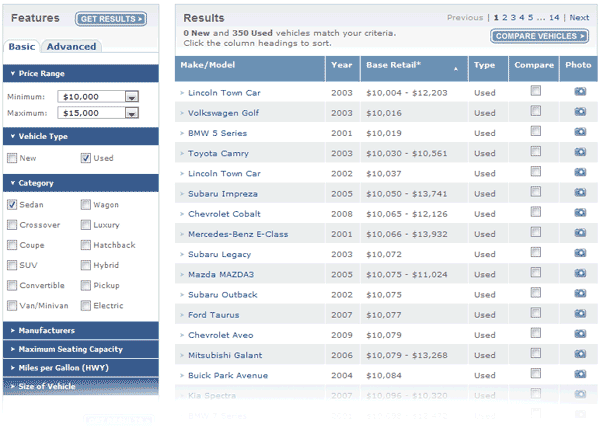Used Car Buying Guide
1. The Basics
Buying used is smart if you want to save money. It's because new cars depreciate quickly - usually losing half their value within three years.
However, used cars do have drawbacks. Even if you're careful, there's no way to guarantee a problem-free vehicle. And since most don't come with a warranty, you could be stuck with expensive repairs.
Despite the negatives, buying a three-to-five-year-old used vehicle will net you maximum savings. That's the ideal age - old enough for major depreciation to have taken place, but not too old where problems are likely - and there's always a chance it could still be covered by a warranty.
If the car doesn't come with a warranty - it's actually not a bad idea to consider getting one. You can read more about extended warranties here.
2. Research
Your choice of car depends mainly on what you can afford, so it's important to know which used vehicles fit your budget before you begin researching.
Kelly Blue Book provides a tool called "Perfect Car Finder" which lets you select different parameters and lets you view a list of vehicles within your price range.
When narrowing down your options, it's best to select vehicles with good reliability ratings.
Consumer Reports, J.D. Power, TrueDelta, and CarComplaints are good sources to start with. Car forums are also excellent places to post questions regarding reliability and common problems. If you're interested in a Toyota Camry, just search for "Toyota Camry Forums" or "Toyota Forums" and you'll get plenty of results. One final thing I recommend is calling repair shops that specialize in that particular model. Ask them what kind of problems they see often and whether or not they recommend the vehicle.
Provides comprehensive reliability information on most used vehicles. Lots of free info available, but you'll have to pay $26 per year to access the good stuff.
A trusted source for vehicle quality, reliability, and dependability ratings. And it's free :)
Provides unique car reliability information detailing actual repair frequencies. Updated on a quarterly basis.
Provides info on what breaks, how often, and how much it costs to fix.
Once you've narrowed down your list of choices, use the following online car-listing sites to find vehicles in your local area.
Also has over 3 million listings (many overlap with Cars.com, but it's good to search both).
Contains the largest private party listings. Difficult to navigate and search.
Aggregates listings from several sites and shows whether the vehicles are overpriced or underpriced.
3. Negotiating Price
Since each used car is different (mileage, condition, options, etc), you need to use your judgement to determine what constitutes a good deal.
Car pricing guides such as KBB, ClearBook, BlackBook, and NADAguides are good for "ballpark" prices. But the best method to determine value is to test drive and inspect several different vehicles - the more, the better.
Don't just rely on photos and descriptions. You need to inspect the car in person to get a good feel for what its worth. Take your time shopping. The more you rush, the less likely you'll get a good deal.
The most popular vehicle pricing guide. Good for "ballpark values" - take it with a grain of salt.
Analyzes car listings and used car sales to predict local pricing and trends. I like this one a lot.
The guide most dealers use to determine wholesale prices for used vehicles. (requires subscription)
Another source used by dealers. $4.95 gives you access for 24 hours.
When negotiating with a private party, use the same tactics dealers use: point out all the flaws such as scratches, dings, weird noises, or stains. This puts psychological pressure on the seller to devalue the car, making it easier to negotiate.
It's best if you can get them to make the first offer. Ask for their rock-bottom price - sometimes you'll get eager sellers willing to knock hundreds or thousands off the price without even trying.
When negotiating with a dealer, you really need to be familiar with the current market conditions, and see how all the other dealers are pricing their vehicles. Each dealer has a different pricing strategy, some have asking prices with a large profit built-in, while others list the lowest prices they're willing to offer with very little room for negotiation.
CarGurus and Vast.com provide graphs showing how the asking price of used cars relate to each other. These are great resources for research.

It's best to negotiate with dealers via email or phone. They'll ask you to come to the dealership, so they can wear you down, but don't fall for it. Obviously, you'll need to visit dealerships to inspect and test drive the vehicles, but only take notes - don't try to negotiate while you're there. Read the full article: how to negotiate a used car for more detailed info.
4. Before You Buy
I'm going to try to make this as clear as possible: You MUST get a used car inspected by a professional mechanic before purchasing. Absolutely no exceptions - even if it's a certified used car being sold by a dealer.
Don't trust what anyone tells you. Both dealers and individuals lie constantly about the condition of their vehicles.
Getting it inspected is not completely fool-proof, but it's your best tool to prevent headaches down the road. Don't skimp out on this - make sure you use a mechanic who specializes in that particular brand. Mobile inspections and ones where they don't put the car up on a lift are not going to cut it.
But before you pay money for an inspection, make sure the car comes back with a clean history report. Most dealers will provide you with a free CarFax or AutoCheck report. If not, it only costs about $30 to get one. Keep in mind they're not always accurate - if an accident was never reported, it will not show up in the reports.





Got a Question About This Article?